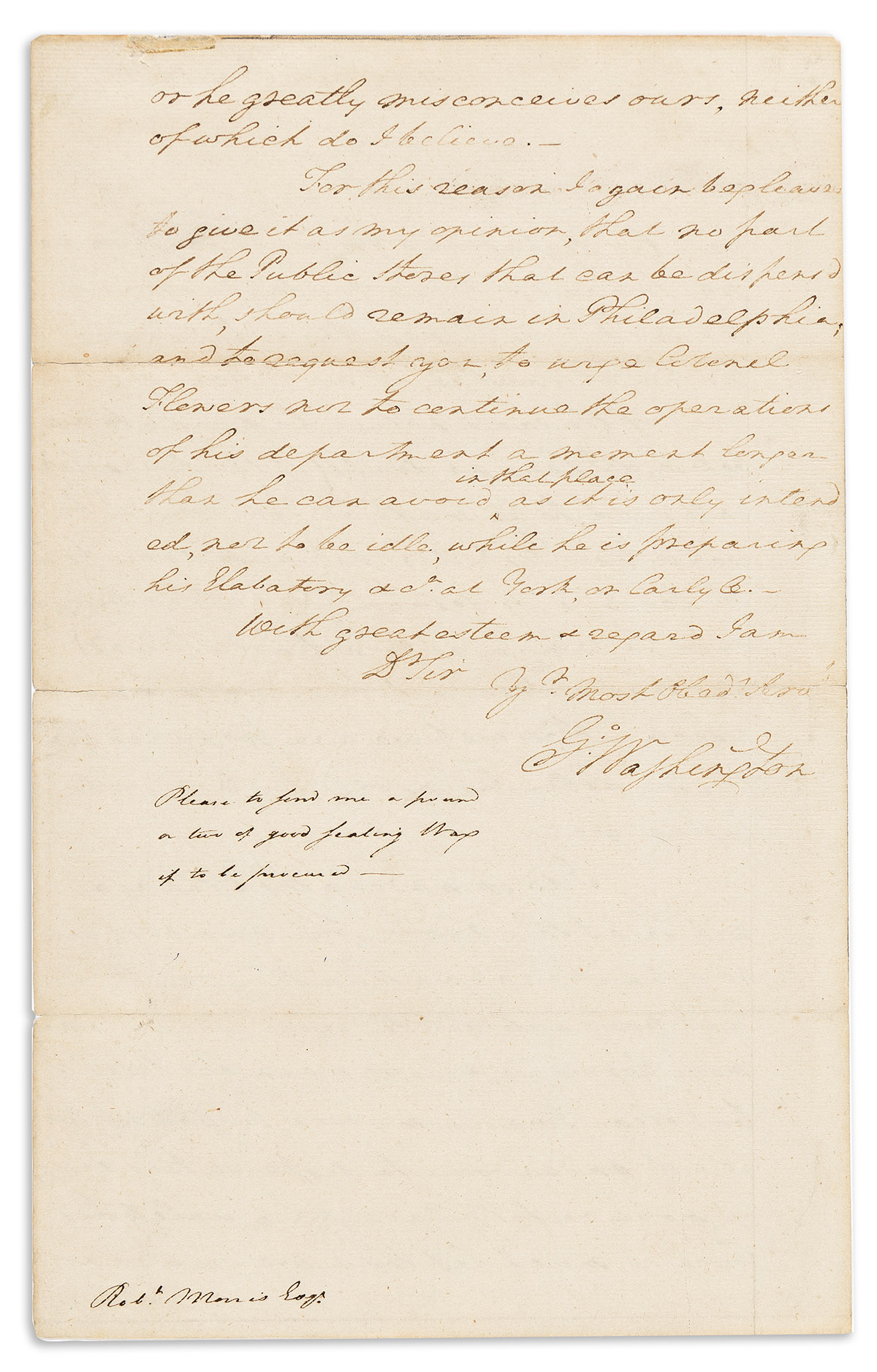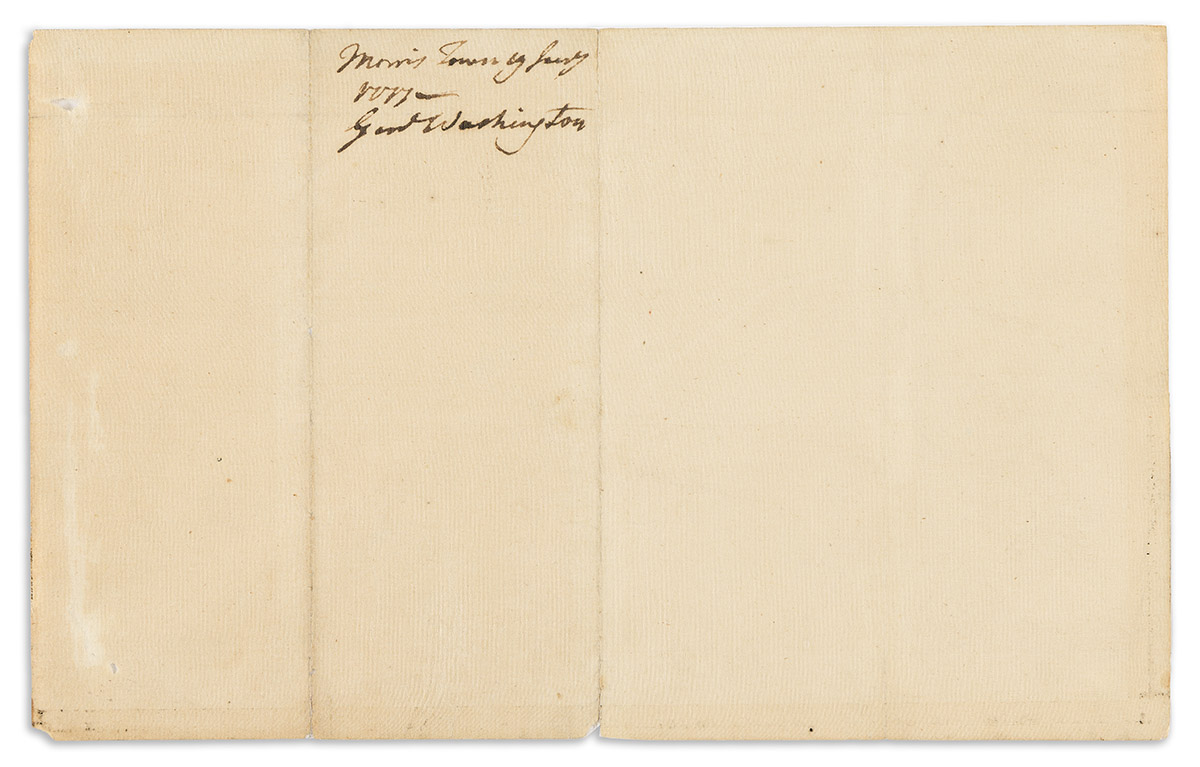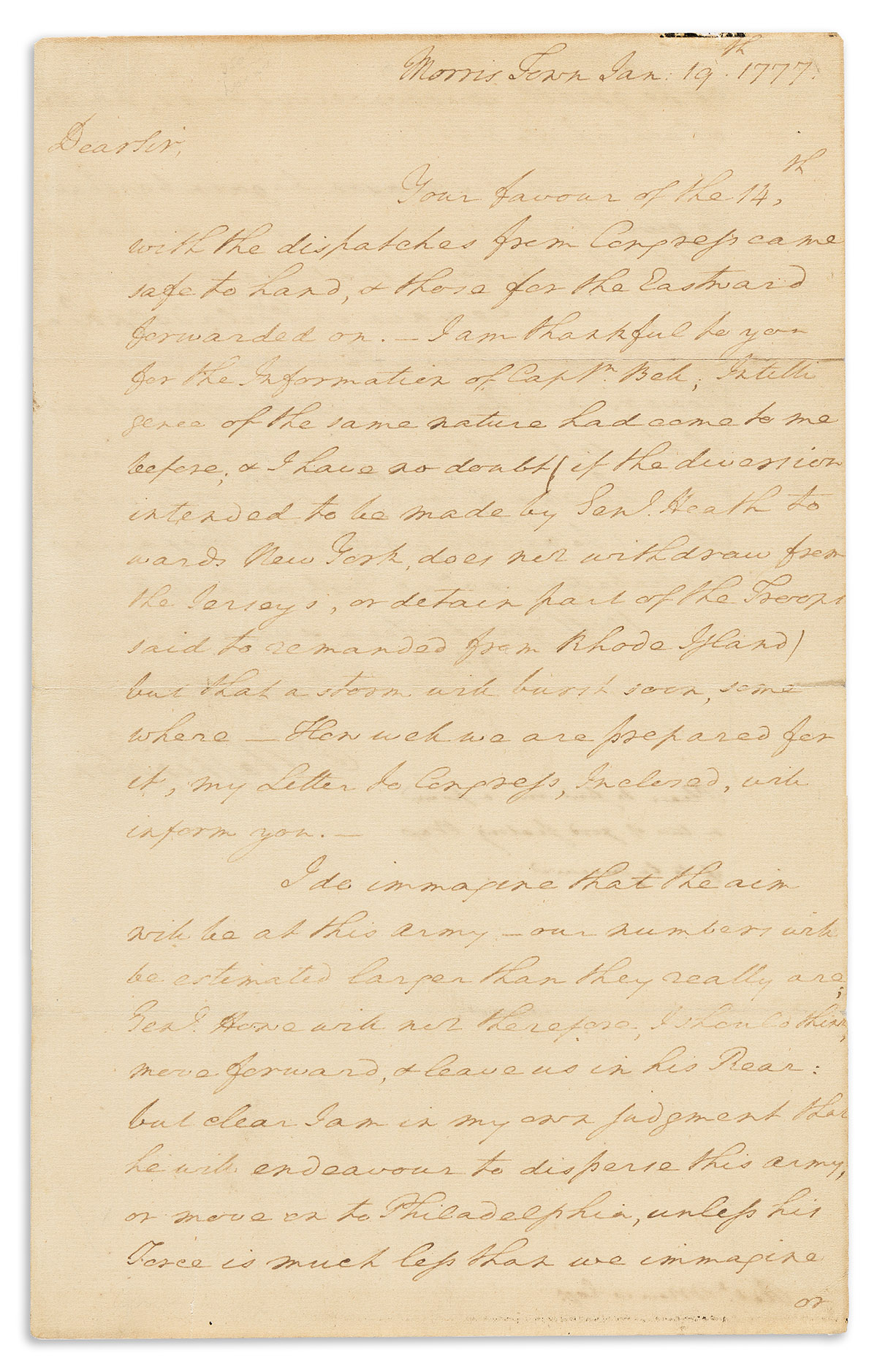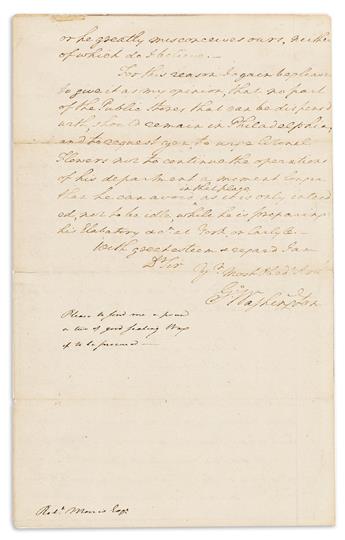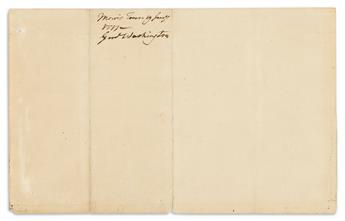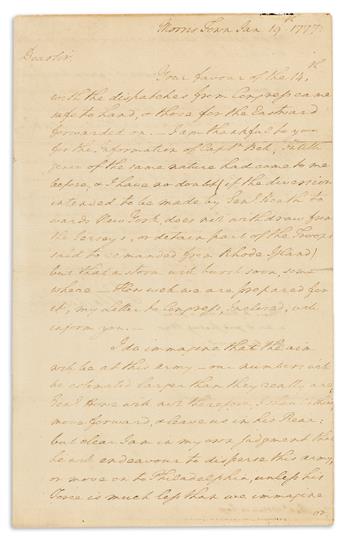Sale 2686 - Lot 26
Unsold
Estimate: $ 100,000 - $ 150,000
PREPARING TO CONFRONT HOWE'S PHIL'A CAMPAIGN: "A STORM WILL BURST SOON" (AMERICAN REVOLUTION.) WASHINGTON, GEORGE. Autograph Letter Signed, "G:Washington," as Commander in Chief, to Robert Morris, thanking for conveying intelligence from Captain Bell [sea captain who recently escaped from prisoner of war camp in New York City reporting that most British troops are in New Jersey and that more are coming], anticipating a major British attack ("a Storm will burst soon") unless General Heath's diversion in New York City succeeds [William Heath led a failed siege of Fort Independence intending to draw British troops from New Jersey to its defense, January 18-29], enclosing a letter to John Hancock [explaining that the Continental Army is not prepared for a major attack; not present], speculating that General Howe will either attack the Army or advance to Philadelphia, recommending that supplies be moved from Philadelphia and that [Commissary General] Colonel Flower cease operating there as soon as possible. The postscript and addressee (i.e., the last four lines) written in the hand of his aide-de-camp, Alexander Hamilton: "Please to find me a pound / or two of good sealing Wax / if to be procured / Rob't Morris Esq'r." 1½ pages, folio, with integral blank (now detached); silked on first and fourth pages, short closed separations at horizontal folds, remnants of hinging at upper edge of second page, faint scattered bleedthrough affecting first page, docketing in hand of Morris written vertically on terminal page: "Morris Town 19 Jan'y / 1777-- / Gen'lWashington." Morristown, 19 January 1777
Additional Details
In full: "Your favour of the 14th, with the dispatches from Congress came safe to hand, & those for the Eastward forwarded on. I am thankful to you for the Information of Capt'n Bell; Intelligence of the same nature had come to me before; & I have no doubt (if the diversion intended to be made by Gen'l Heath towards New York, does not withdraw from the Jerseys, or detain part of the Troops said to [be] remanded from Rhode Island) but that a storm will burst soon, some where. How well we are prepared for it, my Letter to Congress, Inclosed, will inform you.
"I do immagine that the aim will be at this army--our numbers will be estimated larger than they really are; Gen'l Howe will not therefore, I should think, move forward, & leave us in his Rear: but clear I am in my own judgment that he will endeavour to disperse this army, or move on to Philadelphia, unless his Force is much less than we immagine or he greatly misconceives ours, neither of which do I believe.
"For this reason I again beg leave to give it as my opinion, that no part of the Public Stores that can be dispers'd with, should remain in Philadelphia; and to request you, to urge Colonel Flower not to continue the operations of his department a moment longer than he can avoid in that place as it is only intended, not to be idle, while he is preparing his Elab[or]atory &c[eter]a at York, or Carlyle."
Published in The Writings of George Washington, ed. John C. Fitzpatrick, vol. 7, p 32.
In the weeks following General Washington's Christmas 1776 crossing of the Delaware River and his victories at Trenton and Princeton (December 26 and January 3), the Continental Army encamped at Morristown, significantly weakened by disease, desertion, and the casualties of battle. There were only skirmishes and minor battles while Washington replenished his ranks and a new military supply base was built at a distance from Philadelphia, its present location--a city that Washington recognized was soon to come under attack. Robert Morris came to be known as the "Financier of the Revolution" partly because of moments like this, for Washington depended upon Morris to provide the funds needed to move and rebuild the Continental Army's stores. Howe's long-anticipated plan to capture Philadelphia was realized at the Battle of Brandywine in early September, when the storm finally burst.
"I do immagine that the aim will be at this army--our numbers will be estimated larger than they really are; Gen'l Howe will not therefore, I should think, move forward, & leave us in his Rear: but clear I am in my own judgment that he will endeavour to disperse this army, or move on to Philadelphia, unless his Force is much less than we immagine or he greatly misconceives ours, neither of which do I believe.
"For this reason I again beg leave to give it as my opinion, that no part of the Public Stores that can be dispers'd with, should remain in Philadelphia; and to request you, to urge Colonel Flower not to continue the operations of his department a moment longer than he can avoid in that place as it is only intended, not to be idle, while he is preparing his Elab[or]atory &c[eter]a at York, or Carlyle."
Published in The Writings of George Washington, ed. John C. Fitzpatrick, vol. 7, p 32.
In the weeks following General Washington's Christmas 1776 crossing of the Delaware River and his victories at Trenton and Princeton (December 26 and January 3), the Continental Army encamped at Morristown, significantly weakened by disease, desertion, and the casualties of battle. There were only skirmishes and minor battles while Washington replenished his ranks and a new military supply base was built at a distance from Philadelphia, its present location--a city that Washington recognized was soon to come under attack. Robert Morris came to be known as the "Financier of the Revolution" partly because of moments like this, for Washington depended upon Morris to provide the funds needed to move and rebuild the Continental Army's stores. Howe's long-anticipated plan to capture Philadelphia was realized at the Battle of Brandywine in early September, when the storm finally burst.
Exhibition Hours
Exhibition Hours
Aliquam vulputate ornare congue. Vestibulum maximus, libero in placerat faucibus, risus nisl molestie massa, ut maximus metus lectus vel lorem.



